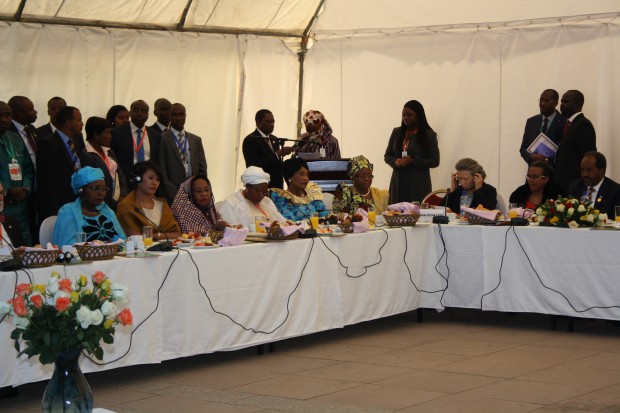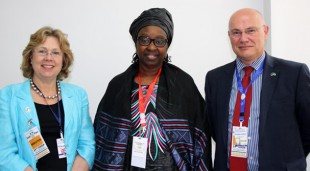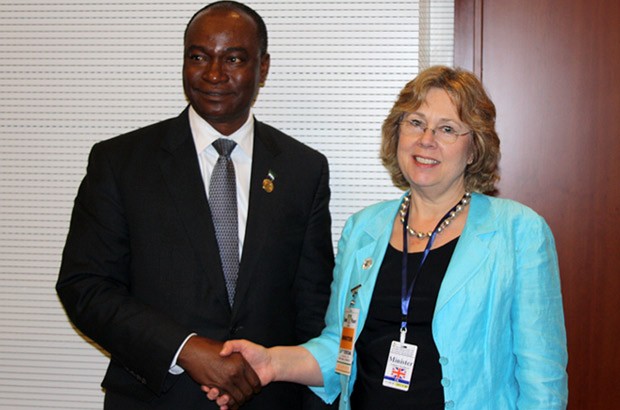This week, Addis Ababa has played host to the African Union (AU) Summit. While 2015 is the AU’s year of women’s empowerment – one of the issues I’ve focused on here this week – Ebola has, of course, taken centre stage as well. Both issues provide a clear demonstration of the kind of African leadership the UK is working to support.
The Girl Summit last year and the African Union’s Campaign to End Child Marriage are building global momentum to improve the lives of girls and women everywhere.
But we must go further. I am here at the AU summit to lobby for faster progress. I attended an extraordinary breakfast hosted by the First Ladies of Africa to press for progress on ending child marriage, where we heard from a brave young Nigerian woman who had been married at the age of 13 – to a man whose name she didn’t even know – and had her childhood stolen from her. In a halting voice, with a scarf across her face to conceal her identity, she urged us to ensure that other young girls could stay in school, as she had wished, not lose their childhoods, and choose a partner only when ready.


I met the impressive AU Commissioner for Social Affairs, who talked with huge passion about the AU’s new Campaign to End Child Marriage, which has kicked off in Niger (where 78% of girls are married before the age of 18) and Ethiopia.
And I met the wonderful AU Special Envoy for Women, Peace and Security, Madame Bineta Diop, who has made huge efforts to tackle violence against women and girls and promote the role of women in preventing and resolving conflict, including in Somalia and Nigeria.
African women – along with many of their male counterparts – are leading the charge against child, early and forced marriage, as well as female genital mutilation, and the UK is supporting this African-led movement.
Meanwhile, whilst we must not be complacent, it looks as though we are turning a corner on the Ebola crisis. The transmission rate for Ebola has started to come down. This has been the result of the commitment of the affected governments, behaviour change by communities, and the support of the international community – not least the more than 800 healthcare workers the AU has deployed to Ebola-affected countries.
As the virus starts to come under control, the governments of the affected countries and the international community can start to think about long-term recovery, as well as what we might do differently in future as a result of the lessons the crisis has taught us.

I attended a UN-AU Ebola Conference to consider how the UK might support affected countries, and the rest of Africa, to move on from Ebola. I met the head of the UN’s Economic Commission for Africa, which recently released a report calculating the economic impact of Ebola. They are calling for debt relief for the affected countries, a focus on rebuilding health systems, and national recovery plans led by the affected countries themselves.
And the UN will undertake Ebola Recovery Assessments by the end of February, which will help the UK and others focus on how to build health systems and improved data to tackle Ebola and other diseases, and to support the recovery of Sierra Leone, Liberia and Guinea.
The UK’s own response to Ebola has been huge. Leading for the international community in Sierra Leone, where we have been working closely with the government and our partners, we have committed £325 million to fighting the disease. The UK is supporting 1400 treatment and isolation beds – over half of all the beds in Sierra Leone – 3 new laboratories, and training and equipping of burial teams to ensure safe burial practices.
But our assistance could not have had the effect it has without the extraordinary leadership shown by President Koroma and his government, by the thousands of Sierra Leonean and African healthcare workers, and by the communities themselves.
It is these leaders – from heads of state to local children – who are the future of Africa. And I am delighted that we are helping these Africa-led movements to ensure that the rights of women are not somehow to be sidelined, or if epidemics hit, that we play our part in helping to turn things around.
Sign up for email updates from this blog, or follow Lindsay on Twitter.

Recent Comments